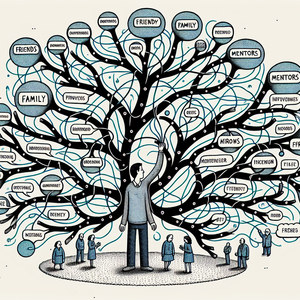Women in Tech: Austin's Trailblazers

The tech industry has historically been characterized by gender disparities, with women underrepresented in technical and leadership roles. However, Austin provides a vibrant community of female entrepreneurs and leaders who are breaking down these barriers. One such trailblazer is Dr. Jennifer Doudna, co-founder of a biotech startup focused on CRISPR technology. Doudna’s journey exemplifies how women can lead groundbreaking advancements in science and technology. Her determination to create a diverse and inclusive workplace has made her company not just a leader in innovation but also a model for others in the industry. Another notable figure is Holly Huynh, CEO of BigCommerce, a leading e-commerce platform based in Austin. Under Huynh's guidance, the company has experienced significant growth, while prioritizing diversity and inclusion initiatives. Huynh emphasizes that having varied perspectives in leadership roles leads to better decision-making and ultimately drives success. Her leadership style reflects a commitment to fostering an inclusive culture, demonstrating how women can excel in executive positions within the tech sector.
Challenges Faced
Despite the progress made, women in tech still face numerous challenges. According to a report by the National Center for Women & Information Technology, women hold only 26% of computing jobs, and many encounter obstacles such as unconscious bias and a lack of mentorship. Austin’s female tech leaders have openly shared their struggles, emphasizing the importance of building supportive networks. Natalie Hodge, co-founder of a fintech startup that aims to simplify personal finance management, offers a poignant example. Hodge recounts her experience of being one of the few women in a predominantly male boardroom. She highlights the importance of mentorship and seeks to pay it forward by supporting young women entering the tech industry. Hodge’s story serves as a reminder that while challenges exist, they can be overcome with resilience and community support.
The Role of Community and Mentorship
Austin's tech ecosystem has been instrumental in fostering a supportive environment for women. Organizations like Women Who Code and Girls Who Code have established networks that connect women in tech, providing resources, mentorship, and opportunities for professional development. These organizations not only empower women but also encourage collaboration among tech professionals, creating a culture of inclusivity. Moreover, initiatives like Capital Factory, which provides funding and resources specifically for women-led startups, have made a significant impact. Their commitment to diversity has resulted in increased investment for women entrepreneurs, helping to bridge the funding gap that often affects female-led ventures. As a result, female founders in Austin are finding more opportunities to secure the capital needed to grow their businesses.
Inspiring the Next Generation
The stories of these women serve as an inspiration for the next generation of female leaders in tech. By sharing their experiences and insights, they encourage young girls to pursue careers in technology and entrepreneurship. Events like Austin Startup Week and local hackathons often feature panels and workshops led by successful women in the industry, providing invaluable exposure and encouragement for aspiring tech enthusiasts. Programs in local schools and universities also aim to engage girls in STEM fields, fostering interest from a young age.
As Austin continues to solidify its position as a leading tech hub, the contributions of women in the industry cannot be overlooked. The trailblazers highlighted in this article are not only breaking barriers but also paving the way for future generations of women in tech. Their stories exemplify the importance of diversity and inclusivity in driving innovation and success within the tech ecosystem. By supporting and empowering female entrepreneurs, we can create a brighter, more equitable future for the industry as a whole. As we celebrate these trailblazers, it is crucial to recognize that their journeys are just beginning, and their impact will resonate for years to come. By continuing to uplift and support women in tech, Austin can serve as a model for other cities aiming to foster diversity and inclusiveness within the technology sector. The future of tech is not only about innovation but also about ensuring that all voices are heard and represented.
Diversity and Inclusion Program Manager
Google, Dell, startups
Core Responsibilities
Develop and implement diversity initiatives to enhance workplace inclusion and representation.
Analyze current company culture and employee demographics to identify areas for improvement.
Conduct training sessions and workshops to promote awareness and understanding of diversity issues.
Required Skills
Strong communication and interpersonal skills to engage with employees at all levels.
Experience in project management and data analysis to measure program effectiveness.
Familiarity with diversity best practices and regulatory requirements.
Product Manager - Women’s Health Tech
Clue, Ava, health tech startups
Core Responsibilities
Lead the product development lifecycle for health technology solutions aimed at women's health needs.
Collaborate with cross-functional teams to define product vision, strategy, and roadmap.
Conduct user research and gather feedback from female users to inform product enhancements.
Required Skills
Background in healthcare technology or a related field, with knowledge of women's health issues.
Strong analytical skills to interpret market trends and user data.
Experience in agile methodologies and product lifecycle management.
Software Engineer - Machine Learning for Social Impact
Nonprofits, research institutions, tech companies
Core Responsibilities
Design and implement machine learning algorithms to address social issues, such as gender equality.
Collaborate with data scientists and social researchers to analyze data and develop insights.
Participate in coding reviews and contribute to open-source projects that promote ethical AI.
Required Skills
Proficiency in programming languages like Python and R, along with experience in ML frameworks (e.g., TensorFlow, PyTorch).
Understanding of ethical considerations in AI and data privacy.
Experience working in interdisciplinary teams focusing on societal challenges.
Technical Writer - Developer Documentation
Microsoft, IBM, startups
Core Responsibilities
Create and maintain comprehensive documentation for software development tools and APIs.
Work closely with engineering teams to understand product features and user needs.
Organize user feedback sessions to refine documentation and improve usability.
Required Skills
Excellent writing and editing skills with a knack for simplifying complex technical concepts.
Familiarity with software development processes and tools (e.g., Git, Markdown).
Ability to collaborate with technical teams and translate jargon into accessible language.
Cybersecurity Analyst - Focus on Women in Tech Initiatives
Cybersecurity firms, governmental agencies, tech companies
Core Responsibilities
Monitor and analyze security threats and vulnerabilities in tech environments.
Develop programs and outreach initiatives to encourage women to pursue careers in cybersecurity.
Collaborate with educational institutions to implement cybersecurity training for young women.
Required Skills
Knowledge of cybersecurity practices, threat modeling, and risk assessment.
Strong analytical skills to interpret security data and trends.
Experience in community engagement and mentorship programs.


